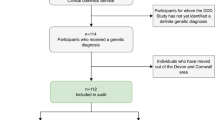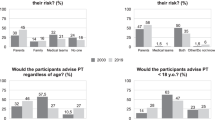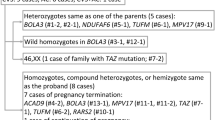Abstract
The objective of this study was (1) to determine the impact of prenatal diagnosis (PND) for Huntington disease (HD) on subsequent reproductive choices and family structure; and (2) to assess whether children born after PND were informed of their genetic status. Out of 354 presymptomatic carriers of HD gene mutation, aged 18–45 years, 61 couples requested 101 PNDs. Fifty-four women, 29 female carriers and 25 spouses of male carriers, accepted to be interviewed (0.6–16.3 years after the last PND, median 6.5 years) on their obstetrical history and information given to children born after PND. Women were willing to undergo two or more PNDs with a final success rate of 75%. Reproductive decisions differed depending on the outcome of the first PND. If favourable, 62% couples decided against another pregnancy and 10% chose to have an untested child. If unfavourable, 83% decided for another pregnancy (P<0.01), and the majority (87%) re-entered the PND procedure. In contrast, after a second PND, only 37% asked for a PND and 30% chose to have an untested child. Thirty-three percent had both, tested and untested children. Among children born after PND, 10 years and older, 75% were informed of their genetic status. The decision to prevent transmission of the HD mutation is made anew with each pregnancy. Couples may need more psychological support after PND and pre-counselling sessions should take into account the effect of the outcome of a first PND on subsequent reproductive choices.
Similar content being viewed by others
Log in or create a free account to read this content
Gain free access to this article, as well as selected content from this journal and more on nature.com
or
References
Schulman JD, Black SH, Handyside A, Nance WE : Preimplantation genetic testing for Huntington disease and certain other dominantly inherited disorders. Clin Genet 1996; 49: 57–58.
Van Rij MC, De Rademaeker M, Moutou C et al: Preimplantation genetic diagnosis (PGD) for Huntington’s disease: the experience of three European centres. Eur J Hum Genet 2012; 20: 368–375.
Semaka A, Kay C, Doty C et al: CAG size-specific risk estimates for intermediate allele repeat instability in Huntington disease. J Med Genet 2013; 50: 696–703.
Hayden MR : Predictive testing for Huntington’s disease: the calm after the storm. Lancet Lond Engl 2000; 356: 1944–1945.
Goizet C, Lesca G, Dürr A : French Group for Presymptomatic Testing in Neurogenetic Disorders: Presymptomatic testing in Huntington’s disease and autosomal dominant cerebellar ataxias. Neurology 2002; 59: 1330–1336.
Tassicker RJ, Teltscher B, Trembath MK et al: Problems assessing uptake of Huntington disease predictive testing and a proposed solution. Eur J Hum Genet 2009; 17: 66–70.
Morrison PJ, Harding-Lester S, Bradley A : Uptake of Huntington disease predictive testing in a complete population. Clin Genet 2011; 80: 281–286.
Hawkins AK, Creighton S, Hayden MR : When access is an issue: exploring barriers to predictive testing for Huntington disease in British Columbia, Canada. Eur J Hum Genet 2013; 21: 148–153.
Simpson SA, Zoeteweij MW, Nys K et al: Prenatal testing for Huntington’s disease: a European collaborative study. Eur J Hum Genet 2002; 10: 689–693.
Evers-Kiebooms G, Nys K, Harper P et al: Predictive DNA-testing for Huntington’s disease and reproductive decision making: a European collaborative study. Eur J Hum Genet 2002; 10: 167–176.
van Rij MC, de Koning Gans P a. M, Aalfs CM et al: Prenatal testing for Huntington’s disease in the Netherlands from 1998 to 2008. Clin Genet 2014; 85: 78–86.
Decruyenaere M, Evers-Kiebooms G, Boogaerts A et al: The complexity of reproductive decision-making in asymptomatic carriers of the Huntington mutation. Eur J Hum Genet 2007; 15: 453–462.
van Rij MC, de Koning Gans P a. M, van Belzen MJ et al: The uptake and outcome of prenatal and pre-implantation genetic diagnosis for Huntington’s disease in the Netherlands (1998-2008). Clin Genet 2014; 85: 87–95.
Adam S, Wiggins S, Whyte P et al: Five year study of prenatal testing for Huntington’s disease: demand, attitudes, and psychological assessment. J Med Genet 1993; 30: 549–556.
Sizer EB, Haw T, Wessels T-M, Kromberg JGR, Krause A : The utilization and outcome of diagnostic, predictive, and prenatal genetic testing for huntington disease in johannesburg, South Africa. Genet Test Mol Biomark 2012; 16: 58–62.
Creighton S, Almqvist EW, MacGregor D et al: Predictive, pre-natal and diagnostic genetic testing for Huntington’s disease: the experience in Canada from 1987 to 2000. Clin Genet 2003; 63: 462–475.
MacLeod R, Tibben A, Frontali M et al: Recommendations for the predictive genetic test in Huntington’s disease. Clin Genet 2013; 83: 221–231.
Guidelines for the molecular genetics predictive test in Huntington’s disease: International Huntington Association (IHA) and the World Federation of Neurology (WFN) Research Group on Huntington’s Chorea. Neurology 1994; 44: 1533–1536.
Divorces. Ined - Inst. Natl. D’études Démographiques. Available at https://www.ined.fr/fr/tout-savoir-population/chiffres/france/mariages-divorces-pacs/divorces/ (accessed 22 Oct 2015).
Richards F, Williams K : Impact on couple relationships of predictive testing for Huntington disease: a longitudinal study. Am J Med Genet A 2004; 126 A: 161–169.
Richards FH, Rea G : Reproductive decision making before and after predictive testing for Huntington’s disease: an Australian perspective. Clin Genet 2005; 67: 404–411.
Tyler A, Harper PS : Attitudes of subjects at risk and their relatives towards genetic counselling in Huntington’s chorea. J Med Genet 1983; 20: 179–188.
Etchegary H : Discovering the family history of Huntington disease (HD). J Genet Couns 2006; 15: 105–117.
Dure LS, Quaid K, Beasley TM : A pilot assessment of parental practices and attitudes regarding risk disclosure and clinical research involving children in Huntington disease families. Genet Med Off J Am Coll Med Genet 2008; 10: 811–819.
Durr A, Hahn V, Gargiulo M et al: Analysis of the first 100 candidates for presymptomatic testing of Huntington’s disease in Paris, France (abstract, Med.Genetik, 2, (H-9), 203. Berlin (Germany) 1995.
Gargiulo M, Capecchi T, Lahlou K, Evrard I, Feingold J, Durr A : Maladie dominante à révélation tardive : L’information du risque dans les familles (abstract). Marseille 2002.
Acknowledgements
We thank all patients who participated in the study. Special thanks to Elodie Schaerer who helped with data handling.
Author information
Authors and Affiliations
Corresponding author
Ethics declarations
Competing interests
The authors declare no conflict of interest.
Additional information
Supplementary Information accompanies this paper on European Journal of Human Genetics website
Supplementary information
Rights and permissions
About this article
Cite this article
Bouchghoul, H., Clément, SF., Vauthier, D. et al. Prenatal testing in Huntington disease: after the test, choices recommence. Eur J Hum Genet 24, 1535–1540 (2016). https://doi.org/10.1038/ejhg.2016.59
Received:
Revised:
Accepted:
Published:
Issue date:
DOI: https://doi.org/10.1038/ejhg.2016.59
This article is cited by
-
Informing about genetic risk in families with Huntington disease: comparison of attitudes across two decades
European Journal of Human Genetics (2021)
-
A case-note review of continued pregnancies found to be at a high risk of Huntington’s disease: considerations for clinical practice
European Journal of Human Genetics (2019)



